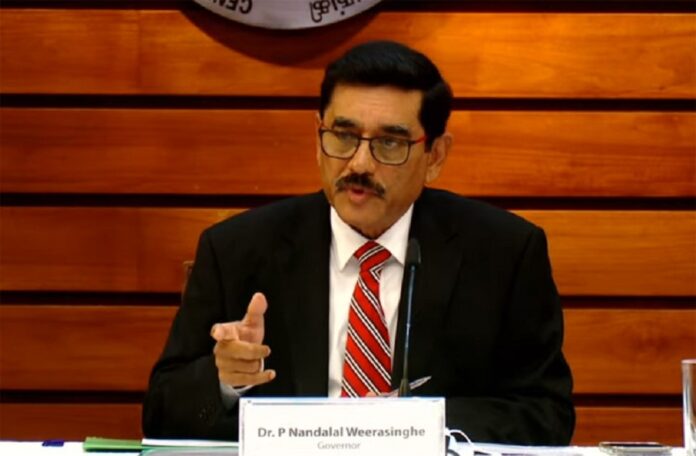Sri Lanka’s parliament has no authority over the whole money in the country although it has the power and responsibility on public money and the Central Bank is the monetary authority with the power over the country’s finance to determine the interest rates and control inflation, CB Governor Nandalal Weerasinghe, claimed.
Clearing the misconceptions on Central Bank affairs, at the media conference on monetary policy review held in Colombo on Thursday 24, Weerasinghe noted that the Central Bank is the independent monetary authority and the treasury is the independent fiscal authority
He categorically stated “I also don’t like, as an independent Central Bank, the fiscal authority dominating my policy making.” The two institutions should work in hand in glove, he added.
At the question and answer session at the media conference, he rejected the reports claiming that he drawing a pension from the International Monetary and a salary of Rs2.5million from the Central Bank making public his salary of around Rs. 400,000.
He disclosed that the salary of the CB Governor has been increased by his predecessor to this amount from. Rs.150, 000.
Briefing the present status of the country’s major persistent issue of negotiations with the IMF, he said Sri Lanka is expecting is expecting to get International Monetary Fund (IMF ) Board approval for the country’s economic reform program by January 2023 after getting debt re-structuring assurances from bi-lateral creditors..
He expressed the belief that they will be able to get the assurance from bilateral creditors in the next couple of weeks after the conclusion of discussions with them. .
Outlining the present economic situation, he said the current monetary base expansion or money printing has been slowing down and it is now stabilized as a result of the tightened monetary policy, he opined.
According to Weerasinghe, the Central Bank has printed money amounting Rs. 341 billion in 2021. However, from January to October this year, it has come down to Rs. 47 billion. In 2020, the monetary base expanded by Rs. 31.6 billion, he revealed.
The Central Bank is borrowing more from Treasury bills with short term maturity which is now in demand among investors , he said adding that their aim is to ensure the higher borrowing cost will decline in the near future with inflation has started to decelerate.
Sri Lanka’s T-bill yields are around double of the key monetary policy rates and the investor demand on Long term maturity T-bills due to fears of domestic debt restructuring.
Central Bank is now policing forex earnings since July this year using the newly introduced monitoring mechanism and it has been observed that exporters are still holding onto their dollar earnings without fully conversion into rupees. .
Sri Lanka is receiving around US$1.45 billion of export earnings with $ 1199 million from hard goods and $ 251 million from services, a month and only $ 326 million has been converted which was less than 23 percent , Deputy Governor Yvette Fernando disclosed.
